
Introduction or What Is a Salesforce Financial Service Cloud?
Financial Services Cloud Salesforce is a versatile CRM platform, specially tailored for finance sector needs. Salesforce Financial Services links different areas of financial institutions – from retail banking to wealth management – over various business areas, locations, and ways of communication. This connected approach gives a complete picture of clients’ financial situations. It puts customers at the heart of every interaction. Launched in August 2015, Salesforce for Financial Services is a package that boosts the features of Sales Cloud and Service Cloud. This makes it more suitable for wealth management firms, insurance companies, and banks. Salesforce Financial Services Advisors and Bankers use Financial Services Salesforce for a comprehensive understanding of their clients. This helps them tweak their sales approach to better serve these clients.
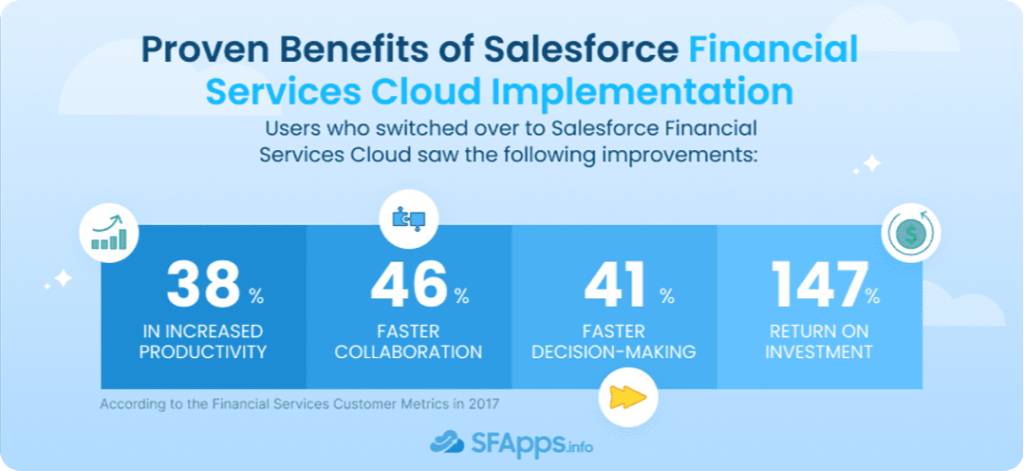
In this article we will cover the following topics:
- Key Salesforce Financial Services Cloud Features
- Analysis of Salesforce Financial Services Cloud Pricing
- Salesforce Financial Services Cloud Cost-Saving Opportunities
- Understanding the Financial Services Cloud Salesforce Data Model
- Industry-Specific Applications of Salesforce Financial Services Cloud
- Salesforce Financial Services Cloud Implementation Steps
- Potential Issues to Beware During Salesforce Financial Services Cloud Implementation
- Top Salesforce Apps for the Financial Industry
- Key Roles and Best Practices in Implementing Salesforce Financial Services Cloud
- FAQs on Salesforce Financial Services Implementation
Key Salesforce Financial Services Cloud Features
Let’s look at the key features of the Financial Services Cloud in Salesforce in detail:
- Data-driven insights: The platform leverages real-time financial data to deliver personalized financial engagement at scale, improving customer loyalty and retention.
- Modern onboarding: Simplifies one of the most complex processes in financial services, enhancing the first impression with customers.
- Service innovation: Uses AI-driven insights and automation to reduce service costs and personalize interactions.
- Business agility: Promotes efficiency and reduces risk by automating data collection, document generation, and workflows.
- Integration with banking and insurance platforms: Connects financial, transaction, and CRM data effectively, supporting a range of accelerators from prebuilt to custom.
- Regulatory compliance: Innovates with built-in solutions for data privacy and ‘Know Your Customer’ (KYC) practices.
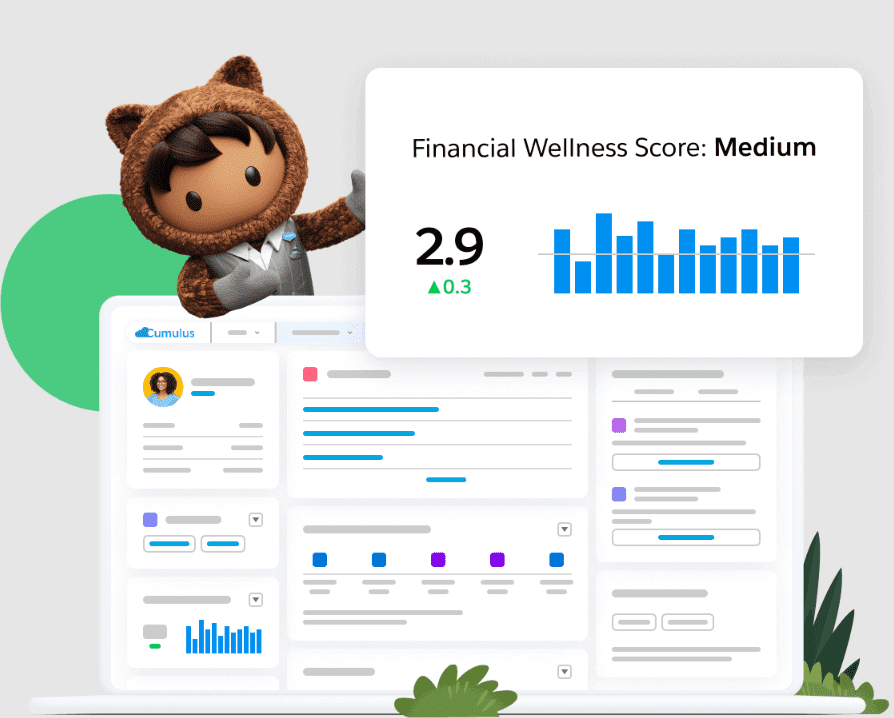
Analysis of Salesforce Financial Services Cloud Pricing
Financial Services Cloud Salesforce Pricing Structure
Salesforce Financial Services Cloud price is based on user needs and organization size. If you are looking for an answer “How much does the Salesforce Financial Services Cloud cost”, you should first decide what edition you will need. Here’s a breakdown of the main categories:
- Enterprise Edition: This edition, focused on service with built-in AI, starts at USD 300 per user per month, billed annually. It’s tailored for organizations looking for comprehensive CRM functionality with industry-specific data models and capabilities.
- Unlimited Edition: For USD 475 per user per month (billed annually), this edition provides extensive CRM services with built-in AI, chat, and 24/7 support. This option suits large-scale financial institutions requiring advanced support and maximum CRM capabilities.
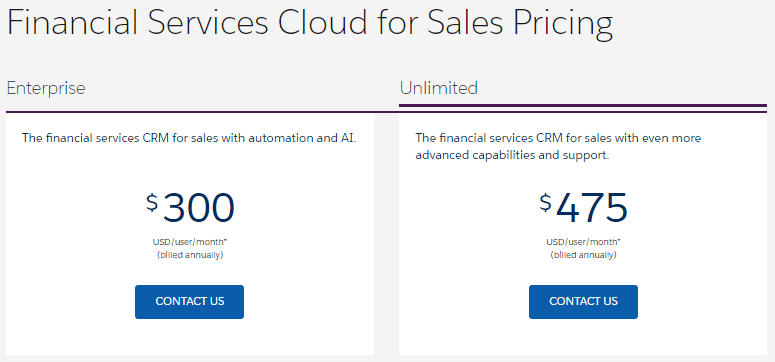
Image Source: Salesforce, Financial Services, Pricing
- Sales and Service Combined: This option offers a holistic view of customer interactions across sales and service departments. The pricing for this combined functionality varies and starts from USD 325.
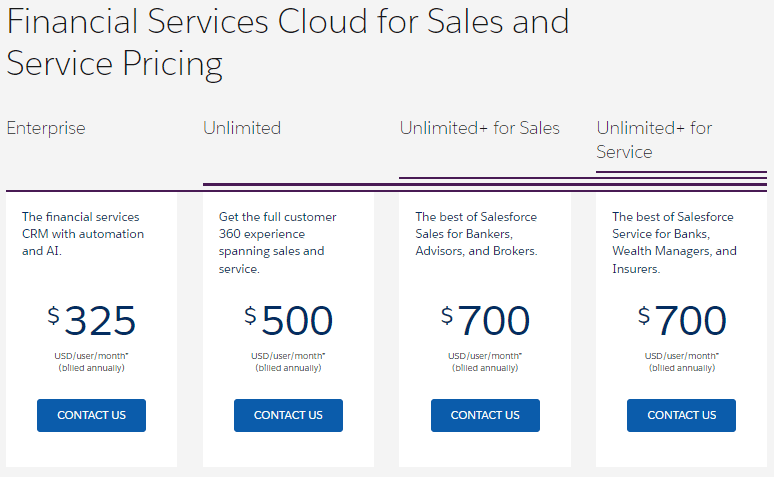
Image Source: Salesforce, Financial Services, Pricing
Salesforce Financial Services Cloud Cost-Saving Opportunities
Salesforce provides opportunities to save costs with its Financial Services Cloud. Here are the opportunities to explore:
- Support and Success Plans: Salesforce offers standard, premier, and signature support plans, with the latter providing more expert guidance and 24/7 support for an additional fee.
- Trial Period: Salesforce offers a 30-day free trial of the Financial Services Cloud, allowing organizations to test the platform before committing financially.
- Customization and Integration Costs: While the basic editions offer a range of functionalities, additional costs may be incurred for customization and integration with other systems. Salesforce’s AppExchange provides a variety of third-party apps and services for additional functionality.
Understanding the Financial Services Cloud Salesforce Data Model
Overview of the Financial Services Cloud Data Model
The data model in the Financial Services Cloud is like a supermodel for data, making the information in the database easy to understand and work with. It lays out each object in the database and defines how these objects are interconnected. For example, in a database, tables are similar to objects in Salesforce Financial Service Cloud, such as the Financial Account object. Columns in these tables are like fields in Financial Services Cloud, as the Client name field, and rows are comparable to records, such as a specific client’s record.
Insight:
FSC not only provides standard Salesforce objects but also includes out-of-the-box financial objects specifically designed to represent business data in the financial sector. These specialized objects include Financial Account, Financial Account Role, Financial Holding, and Securities, among others. These objects and fields can be extended and customized to support specific business requirements, ensuring flexibility and adaptability.
Key Components of the FSC Data Model
- Database Structure: The Salesforce Financial Services Cloud database is a collection of related tables containing data. These tables are analogous to spreadsheet tables, with rows and columns representing different data points.
- Objects, Fields, and Records: In the Salesforce context, tables are referred to as ‘objects’. Each object contains ‘fields’ (like columns in a spreadsheet) and ‘records’ (similar to rows in a spreadsheet). For example, the Financial Account object would have fields like Account Name, Status, and Ownership, and each row in this object would be a unique record.
- Specialized Financial Objects: Beyond the standard Salesforce objects, Financial Services Cloud includes specialized objects to represent financial data accurately. These include Financial Account, Financial Account Role, Financial Holding, and Securities, among others.
- Schema Builder: The Schema Builder in Salesforce provides a visual representation of the data model, showing objects, their fields, and the relationships between them. This tool is instrumental in understanding how different data points are interconnected within the system.
- Customization and Extensibility: One of the strengths of Salesforce Financial Services Cloud is its flexibility. The data model can be extended and customized to meet specific business requirements, allowing for the addition of new objects or modification of existing ones to align with unique operational needs.
Insight:
As customers progress through their journey from initially searching for a wealth manager to the stages of onboarding and devising an investment plan, and finally to executing trades, there’s a notable increase in digital engagement. This progression culminates in a customer expectation that trade transactions should be fully automated.
Industry-Specific Applications of Salesforce Financial Services Cloud
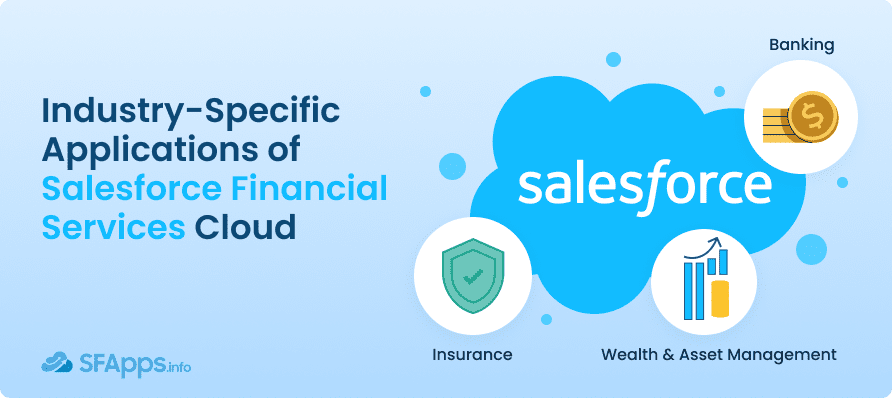
Salesforce Financial Services Cloud (FSC) offers significant advantages to key segments in the financial industry, including banking, insurance, and wealth & asset management.
Salesforce Financial Services Cloud in Banking
In banking, FSC facilitates a more connected and intuitive customer experience. It helps institutions to visualize customer relationships, prioritize referrals, and streamline processes. The platform adapts to regulatory changes in Salesforce Financial Services Cloud mortgages and consumer lending, standardizes customer care in Salesforce Financial Services Cloud banking, and automates commercial lending progress. An example of its effectiveness is seen in Lake City Bank, where the Salesforce Financial Cloud implementation services led to increased system flexibility and speed to market, contributing to revenue growth.
Salesforce Financial Services Cloud in Insurance Industry
FSC provides unique benefits to the insurance sector. It offers a comprehensive view of policyholders and real-time insights and analytics for coverage recommendations. The system’s integration with policy administration and management systems (PAS/AMS) streamlines onboarding workflows and customer journeys. A leading life insurance carrier improved agent and customer satisfaction by redesigning their processes with FSC’s insurance native data model.
Salesforce Financial Services Cloud for Wealth & Asset Management
For wealth and asset management firms, FSC ensures trust and transparency in client relationships. It offers real-time account information, integration of financial accounts, and personalized advice across channels. It’s possible to use FSC to create a complete picture of client data, leading to enhanced client relationships and advisor productivity.
Across these segments, FSC’s capabilities in automating services, integrating with core banking and insurance platforms, and ensuring regulatory compliance stand out. Its approach to personalizing financial engagement and improving customer loyalty through real-time financial data is particularly noteworthy.
Utilization of FSC Across Geographies and Consumer Lines
Salesforce Financial Services Cloud is adaptable across various geographies and both consumer and commercial lines of business. Its capability to integrate sales, service, and marketing into a consistent, personalized customer experience is a key factor in its widespread application across different financial sectors.
Salesforce Financial Services Cloud Implementation Steps
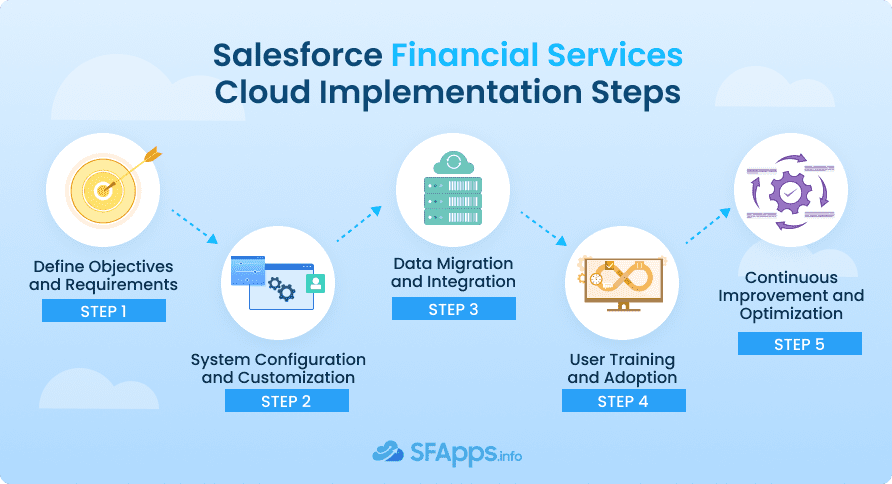
Implementing Salesforce Financial Services Cloud in your organization is a comprehensive process that involves several crucial steps to ensure a successful transition and optimal usage. Here’s a step-by-step guide:
- Define Objectives and Requirements:
- Clearly articulate the objectives you wish to achieve with Salesforce Financial Cloud Services.
- Identify specific needs and requirements of your organization and determine key performance indicators (KPIs) to measure the success of the implementation.
- System Configuration and Customization:
- Configure the Financial Services Cloud to align with your business processes.
- Customize the platform to match your organization’s branding and user interface requirements.
- Integrate the platform with existing systems such as CRM, marketing automation, and data management tools.
- Data Migration and Integration:
- Migrate existing client data to the Financial Services Cloud while maintaining data integrity and accuracy.
- Integrate with external data sources for real-time data synchronization and access.
- User Training and Adoption:
- Conduct comprehensive training sessions for users to familiarize them with the new system.
- Encourage a culture of adoption within the organization, emphasizing the platform’s benefits and value.
- Continuous Improvement and Optimization:
- Regularly assess and optimize your implementation to leverage new features and enhancements from Salesforce.
- Continuously gather feedback from users and clients to identify improvement areas and address any challenges.
The implementation of Salesforce in the Financial Services Cloud is an intricate process that requires meticulous planning and execution. Each of these steps plays a vital role in ensuring that the platform is tailored to meet the unique demands of your organization and that it effectively enhances client engagement and operational efficiency.
Insight:
Heathrow Airport’s implementation of Salesforce for enhancing its digital services has resulted in a substantial 30% increase in digital revenue. By effectively utilizing these technologies, Heathrow has improved its airport service, making it one of the best in the world. This strategic use of data and AI in various aspects of the airport’s operations has not only boosted efficiency but also significantly enhanced customer satisfaction and financial performance.
Potential Issues to Beware During Salesforce Financial Services Cloud Implementation
Implementing Salesforce Financial Services Cloud can be a complex process, and being aware of potential issues can help in navigating the implementation more smoothly. Here are some common challenges and practical suggestions to overcome them:
- Security and Privacy Concerns: Financial organizations handle sensitive data, prioritizing security and privacy. Implement stringent security measures like multi-factor authentication, encryption, and access controls. Establish clear data governance policies to handle sensitive information properly and ensure compliance with regulations like GDPR and PCI DSS.
- Integrating Legacy Systems: Many financial organizations rely on legacy systems, which can be challenging to integrate with modern platforms like Salesforce. Utilize middleware, APIs, and data warehousing strategies to facilitate seamless data exchange and integration.
- Customization Complexities: Salesforce is highly customizable, but over-customization or lack of clear business objectives can lead to a complex and unwieldy implementation. Focus on finding the right balance in customization to meet specific business needs without overcomplicating the system.
- Scalability Issues: As businesses evolve, the Salesforce platform should be able to scale accordingly. Avoid technical debt by starting with basic functionalities and then building upon them. Regularly monitor and optimize the platform’s performance for continuous improvement.
- Training and Adoption Challenges: Proper training is crucial for effectively using the system. Designate a Salesforce admin or Super User within your organization for ongoing training and support. Involving users early in the implementation process can also aid in smoother adoption.
- Regulatory Compliance: Financial services are subject to stringent regulations. Ensure that your Salesforce implementation aligns with industry-specific compliance standards and is regularly audited to remain compliant.
- Digital Experience Management: Financial services companies must prioritize delivering exceptional digital experiences to customers. This involves maintaining high standards of process compliance and data accuracy. Develop a clear strategy and plan for Salesforce implementation that includes training, data validation, and supplementary tools.
- Choosing the Right Implementation Partners: Partnering with a Salesforce Financial Services Consulting company experienced in working with financial services is crucial. They should understand the industry’s specific pain points, needs, and challenges.
Addressing these challenges requires a strategic approach, combining technical expertise with a deep understanding of the financial services industry. Regular assessments and optimizations are key to ensuring the platform evolves with the business needs and regulatory environment.
Top Salesforce Apps for the Financial Industry
Certinia ERP Cloud
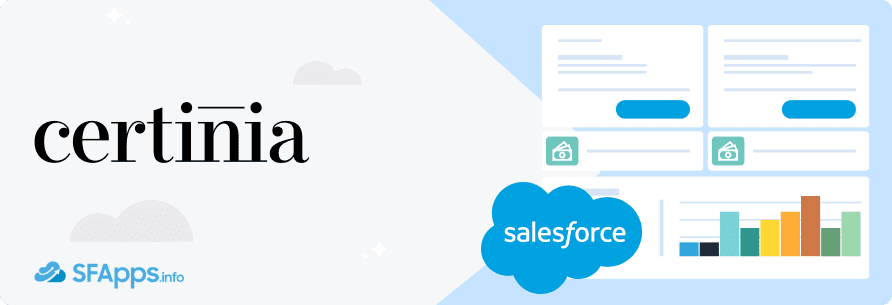
Certinia ERP Cloud is a comprehensive cloud-based software designed to integrate core financial management functions within the Salesforce platform. It streamlines the opportunity-to-cash process, enabling precise management of revenue and providing real-time financial analysis and audit trails. This tool simplifies financial operations, enhances data management, and supports informed decision-making in financial matters. With Certinia ERP Cloud, businesses can unify their financial processes on Salesforce, achieving greater efficiency and control over their financial operations.
nCino
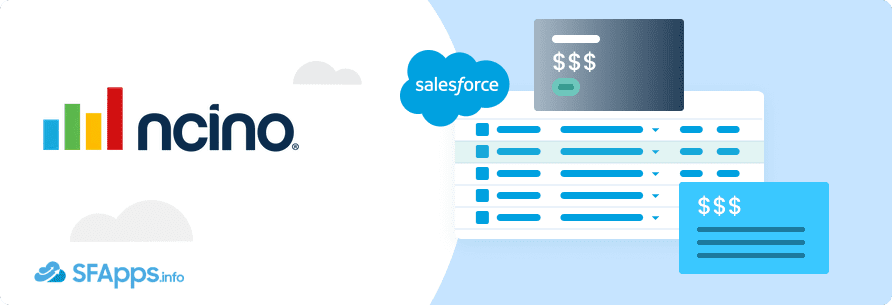
nCino, created by bankers for their peers, revolutionizes banking operations with its cloud-based Bank Operating System®. This comprehensive platform integrates all customer and employee interactions, enhancing efficiency, transparency, and regulatory compliance across various business lines. It’s designed to improve profitability and streamline processes in banking, offering a unified system that covers every aspect of banking operations. This makes nCino a powerful tool for banks seeking to modernize their operations and manage their business more effectively.
Own Recover – Salesforce Data and Metadata Backup & Recovery

Own Recover is a comprehensive data protection solution designed to safeguard both data and metadata through independent backups and precision repair tools. It facilitates quick innovation with sandbox seeding capabilities. The service offers streamlined compliance with unlimited storage and boasts enterprise-grade security. Setting up OwnBackup is straightforward, making it a user-friendly option for businesses that need robust data protection. This tool is particularly beneficial for organizations looking to ensure the safety and integrity of their critical data securely and efficiently.
Accounting Seed: Accounting on Salesforce
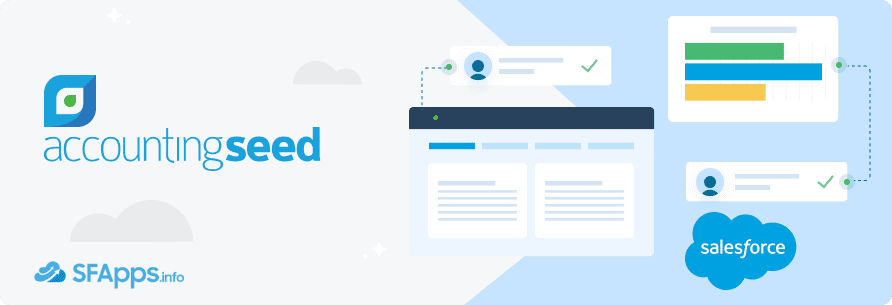
Accounting Seed is a dynamic, Salesforce-based financial management tool designed to automate and streamline financial processes. It empowers businesses to manage their operations with flexibility, offering full control over various financial aspects through Salesforce Financial Services automation, configuration, and customization. This versatile tool caters to a range of financial tasks, from handling multiple ledgers and tracking billing cycle profitability to managing account transactions and profit & loss statements. Accounting Seed’s innovative approach aims to revolutionize traditional accounting practices, making financial management more efficient and tailored to individual business needs.
Blackthorn Payments – Credit Card Processing, ACH, Subscriptions, FSL

Blackthorn Payments is a versatile tool that caters to various industries, including nonprofits, education, healthcare, field service organizations, and international financial services. It is particularly effective for field service-focused organizations, facilitating on-the-spot payment collections. This is achieved through the integration of Field Service Lightning, Bluetooth-enabled card readers, and the Salesforce Mobile App. Blackthorn Payments streamlines the payment process, making it more efficient for teams operating in the field, thereby enhancing the speed and ease of transaction processing.
In addition to specific apps, Salesforce AppExchange is a marketplace where finance teams can find and install various third-party apps to automate tasks, improve workflows, and integrate with other systems, enhancing overall business operations and driving growth.
Key Roles and Best Practices in Implementing Salesforce Financial Services Cloud
In the implementation of Salesforce Financial Services Cloud, various specialists play key roles in ensuring the platform’s effectiveness in enhancing client engagement and improving operational efficiency within financial institutions.
- Salesforce Administrators: They are responsible for the configuration and ongoing maintenance of Salesforce. Their role includes ensuring data security, managing user access, and maintaining the platform’s integrity. Administrators ensure that the system is tailored to the specific needs of the organization and operates smoothly. More detailed information about Salesforce Administrators can be found in the Salesforce Admin technical interview questions.
- Financial Services Cloud Consultants: These specialists possess deep knowledge of Salesforce Financial Services Cloud and tailor the platform to meet the specific requirements of financial institutions. They provide guidance on best practices for Salesforce implementation and advise on financial services strategies.
- Salesforce Developers: Developers play a crucial role in customizing and extending Salesforce functionality. This includes building custom applications and integrations to suit the unique needs of the financial services firm. They work in tandem with administrators and consultants to implement solutions that are specifically tailored to the institution’s needs.
- Salesforce Architects: Architects are responsible for designing and overseeing the implementation of complex Salesforce solutions in the financial services sector. They possess a thorough understanding of the platform’s capabilities and guide projects toward successful completion, ensuring that the solutions meet the strategic objectives of the organization.
- Data Analysts: For finance teams, data analysts are essential in extracting and interpreting insights from Salesforce data. They utilize analytics tools and reports to provide actionable financial insights, aiding in data-driven decision-making.
Successful implementation of Salesforce Financial Services Cloud requires a structured approach, involving a clear definition of objectives, system configuration, data migration, user training, and continuous improvement. It’s essential to ensure that all team members are empowered with the skills needed to thrive in a cloud-centric environment and that there is a shift from a silos mentality to a more integrated approach. This includes fostering a culture of adoption within the organization and regularly assessing and optimizing the implementation to leverage new features and enhancements offered by Salesforce.
By effectively utilizing the expertise of these specialists and following best implementation practices, financial services firms can significantly enhance their operational efficiency, client engagement, and overall business growth.
FAQs on Salesforce Financial Services Implementation
Here are some common questions related to the implementation of Salesforce Financial Services Cloud:
Why do banks need Salesforce?
Salesforce, when deeply integrated into a bank’s systems, significantly boosts its capacity to offer a diverse array of products and services to clients. Staff members in these banks can access detailed information about a customer’s financial activities. This includes observing fluctuations in account balances, monitoring how the account is utilized, and scrutinizing transaction histories. With this data, bank employees are better equipped to discern the specific services or products that might align with a customer’s needs and preferences.
What does the term “financial services” refer to?
The term “financial services” covers a wide spectrum of specialized activities, notably in the realms of banking, investing, and Salesforce Financial Services Cloud insurance. This concept specifically pertains to the range of actions undertaken by firms dedicated to financial services and the expertise of their professional staff. Distinguishing from this, financial products represent the actual tangible offerings provided by these firms. These include various types of accounts, investment opportunities, and insurance policies, each designed to meet different financial needs and goals of consumers.
How can finance teams ensure data security and compliance with regulatory requirements?
Salesforce offers a comprehensive suite of data security features and compliance tools that are particularly valuable for finance teams. Here’s an overview of some key aspects:
Security Health Check: Salesforce provides a Health Check tool, integral to its core platform, which allows administrators to manage their organization’s security settings. This tool helps identify and rectify potentially vulnerable security settings and create custom baseline standards tailored to specific business needs.
Multi-Factor Authentication (MFA): MFA adds a layer of protection against threats like phishing attacks and account takeovers. This is a crucial feature for increasing the security of Salesforce data.
Data Resilience: Salesforce empowers organizations to guard against permanent data loss from external cybersecurity attacks and internal errors. This ensures uninterrupted access to critical data, helping meet compliance and legal requirements, especially during system upgrades and migrations.
Data Masking: Salesforce’s Data Mask feature allows for the de-identification of data, helping businesses stay compliant with regulations like GDPR, FINRA, and PCI DSS. This feature enables the obfuscation of sensitive data, which is essential for maintaining privacy and security during development and testing processes.
Mobile Security: With Salesforce Mobile App Plus, organizations can enforce mobile security policies, manage and secure mobile applications on employees’ devices, and prevent unauthorized use and data loss. This includes blocking file sharing, copy/paste capabilities, and defending against malware and phishing attacks.
In summary, Salesforce’s robust data security features and compliance tools are essential for finance teams to configure access controls, monitor data, and ensure compliance, especially given the sensitivity and regulatory requirements in the financial sector. These features collectively contribute to a secure and compliant operational environment.
What is the role of AI in the Financial Services Cloud?
AI in Salesforce Financial Services Cloud is revolutionizing various aspects of financial management and security. One of the key areas of impact is in fraud detection. The complexity of identifying fraudulent activities in the financial sector has grown significantly, and traditional methods of detection are becoming inadequate. AI-powered data products, by leveraging meticulously curated and continuously updated datasets, excel at identifying subtle anomalies and swiftly flagging potentially fraudulent activities. These AI algorithms are adept at cleaning and organizing data to uncover uncommon patterns, significantly enhancing fraud detection efficiency.
More questions and answers about Salesforce and AI can be found in Service Cloud Einstein Features.
Can Salesforce products be integrated with external applications and systems?
Yes, Salesforce products can often be integrated directly with a wide range of external applications and systems, facilitating seamless data connectivity. For instances where built-in integration isn’t available, particularly with on-premises data sources, alternative solutions are available. One option is to acquire licenses for MuleSoft, which specializes in connecting various software applications, data, and devices. Additionally, Salesforce collaborates with various Salesforce Financial Services integration partners who can assist in establishing connections. Another viable option is exploring the Salesforce AppExchange, a marketplace offering a variety of apps developed to enhance and expand Salesforce functionality, including integration tools.
These FAQs address common queries about Salesforce Financial Services Cloud implementation and usage in the financial industry. In case you would like to know more about different Salesforce Implementations & Solutions, check out the Salesforce Commerce Cloud Implementation Guide.
In Conclusion,
Salesforce Financial Services Cloud is a robust tool for financial institutions aiming to improve customer experience, streamline operations, and enhance financial performance. It offers a variety of features tailored to the financial industry, such as solutions for retail banking, wealth management, and insurance.
The platform enables a comprehensive view of customers, allowing for personalized interactions and insightful data analysis. This enhances client trust and loyalty while boosting operational efficiency.
However, the implementation process has its challenges, including security concerns, integration with existing systems, and the complexities of customization. These challenges can be addressed through careful planning, training, and support from certified Salesforce Financial Services Cloud experts.
The involvement of skilled professionals like administrators, consultants, developers, and architects is crucial for a successful implementation and for the ongoing optimization of the system. Financial companies using Salesforce Financial Services Cloud should prioritize data security, regulatory compliance, and the seamless integration of financial data sources.
Salesforce Financial Services Cloud is a dynamic and adaptable platform that can transform the financial industry. It helps financial institutions keep up with market changes, utilize AI-driven insights, and pursue growth and innovation.

Dorian is a 6X Certified Salesforce Developer and Administrator with a start in the IT world as a CRM Admin in 2020. Since diving into Salesforce in 2021 via Trailhead and Focus on Force, he has achieved a Ranger Rank, earned several Superbadges, and bagged certifications including the Salesforce Certified Administrator, Platform App Builder, Associate and Platform Developer I by 2023. In 2024 he also became Salesforce Certified AI Associate and earned Certified AI Specialist Certification in 2025. Dorian is very keen on continuous learning, always looks for fresh ways to improve his knowledge. He enjoys running, boxing, kickboxing and reading diverse kinds of books in his free time.


 Previous Post
Previous Post Next Post
Next Post
One Response to “Salesforce Financial Services Cloud Implementation Guide”